
Article continues after advertisement
Our feast of fabulous reviews this week includes Becca Rothfeld on Charlotte Shane’s An Honest Woman, Hillary Kelly on Jo Hamya’s The Hypocrite, Megan O’Grady on Yoko Ogawa’s Mina’s Matchbox, Daniel Felsenthal on Beth Linker’s Slouch, and Matthew Stewart on Brenda Wineapple’s Keeping the Faith.
Brought to you by Book Marks, Lit Hub’s home for book reviews.
*
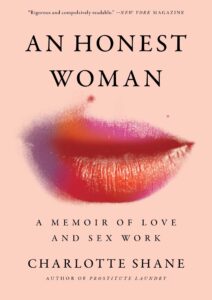
“The writer and sex worker Charlotte Shane defies this dire picture. She is not desperate or downtrodden; she was never kidnapped and sold into sex slavery; and as far as I can tell, she has never longed for the sudden appearance of a white knight. An Honest Woman…is a corrective to incurious narratives in which sex work is assumed to be nothing but an unrelenting debasement. Shane’s path to the world of escorting was sometimes bumpy, but it was freely chosen …
Shane’s memoir begins with recollections of her adolescence, when she was an avid student of desire, and it ends with a moving account of her marriage to a man she loves. In less than 200 pages, the book manages to be part autobiography, part anthropological investigation and part feminist tract—but centrally, it is a eulogy for Roger (not, of course, his real name), who was Shane’s client for nearly a decade … The biggest tragedy of Shane’s career is not the clichéd one envisioned by squeamish critics of sex work. It is not that she has been devalued or debauched, or that she has become too jaded to love, or that she was routinely exploited. It is only the ordinary yet unbearable calamity of death.”
–Becca Rothfeld on Charlotte Shane’s An Honest Woman: A Memoir of Love and Sex Work (The Washington Post)
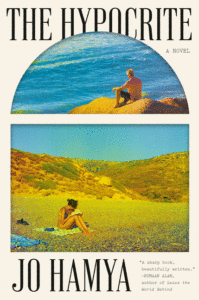
“The Hypocrite is a brilliant litmus test of a novel, which doesn’t mean it’s indecisive or wavering. Hamya, an elder member of Gen Z, proposes that multiple theories can all be true at once—that Boomers can feel indignant about changing social mores while their children encourage necessary change, that men and women can intellectually attack each other with equally wounding vigor, that the question of how to handle womanizers (to purposely use a dated term) is not easily answered by shaming them. How you interpret The Hypocrite says more about you than it does about the novel: Hamya knows that your pity is just as valuable—and misleading—as her characters’ …
What Hamya brings to this modern debacle, besides a precision of language and an aptitude for structure that ought to make her contemporaries quake, is a tenderness you don’t see coming. That’s partly why The Hypocrite doesn’t rest easily among #MeToo novels, despite its subject matter. Pity is a natural feeling between generations, each of which thinks the other is surely misunderstanding something important about life—and yet, bonds are strong: Ceasing to recognize your parent’s or child’s humanity is nearly impossible. Hamya successfully makes a muddle with The Hypocrite, and I mean that as high praise. Contemporary fiction too often seeks the relief of some imagined perfect morality, perhaps because so many readers now conflate the beliefs of characters and their creator. It’s a pleasure to read a 27-year-old writer who embraces the novel’s power to fog up certainties about ‘bad men’—and prods readers to join in.”
–Hillary Kelly on Jo Hamya’s The Hypocrite (The Atlantic)
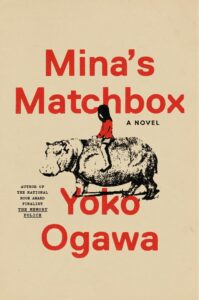
“Mina’s Matchbox is largely a book about storytelling, the conveyance it provides for unresolved emotions, and the way our futures are mapped in large part by our capacity to imagine them. The novel is filled with pocket histories and references to the literary classics that become a kind of liturgy for the girls, such as Katherine Mansfield’s The Garden Party and Yasunari Kawabata’s Snow Country— though another Japanese novel about a wealthy Ashiya family whose way of life is slipping away comes to mind: Junichiro Tanizaki’s World War II-era masterpiece, The Makioka Sisters. A family home isn’t just architecture, but a shared set of stories—ideas, values and narratives to dwell in …
Tomoko’s guileless perspective as the family outsider—rendered in Ogawa’s effervescent prose, translated by Stephen Snyder—balances the almost Wes Anderson-esque tweeness of the mise-en-scène (Ogawa’s vexing use of animals as cute props notwithstanding) … The function of memory—the memories we share with those we love, as well as those we agree upon, or willfully forget, in our telling of history—is a fascination of Ogawa’s … ‘We look at the world once, in childhood,’ Louise Glück wrote in her 1996 poem ‘Nostos.’ ‘The rest is memory.’ Ogawa captures the enduring spark of that imprinting and its oracular glow. We revisit those moments when the match was first struck, when the future still felt like ours to ignite.”
–Megan O’Grady on Yoko Ogawa’s Mina’s Matchbox (The New York Times Book Review)
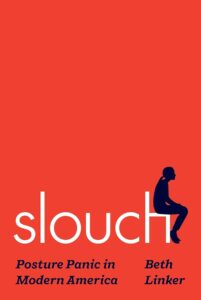
“As Beth Linker, professor of history and sociology of science at the University of Pennsylvania, makes clear in her robust, often astonishing new book, Slouch: Posture Panic in Modern America, erect carriages are markers of American conformity … Linker shows how ableism threaded the country’s social fabric and wove into its growing industries, among them garment and furniture manufacturing and more recently pharmaceuticals. Her book’s remarkable sweep binds a piece of over-discussed and under-substantiated medicine to both broad currents and specific phenomena of the past century, from racism and feminist reform to Buster Brown shoes and the lumbar-supporting chair. A strict ideal of good posture has become essentially universal, but this is hardly a sign of scientific progress: It’s an indicator of how societal pressures drove huge swaths of people to embrace a falsehood …
The history of posture science, and of evolutionary science at large, is full of instances in which disadvantaged, disabled, and nonwhite people have been used as research specimens. Yet the value of good posture has become a commonplace, and an entire economy has arisen from its salubrious promise. How to rid ourselves of such a brittle formulation that has spent 150 years becoming more and more ingrained in our culture? We would need to dispense with the very concept that a correct human anatomy exists. In our capitalist status quo, this would mean floating a potentially more marketable proposition: We could celebrate a diversity of people, rather than upholding the elusive, abusive paradigm of corporeal perfection.”
–Daniel Felsenthal on Beth Linker’s Slouch: Posture Panic in Modern America (The New Republic)
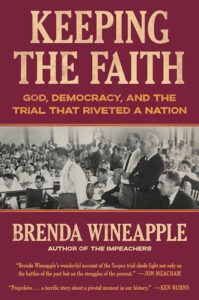
“The schools were banning books. White supremacists were marching in the streets. The donor class was waging a war on democracy. Immigrants, wayward women, bad music and a godless elite were blamed for, well, everything. There’s a lot about the 1920s that feels familiar today. How are we to make sense of the last time America came this close to fascism? … The Scopes trial of 1925—the ‘monkey trial,’ as the irascible journalist H.L. Mencken branded it—was one of those only-in-America events that periodically fill the newspapers of a nation that is always asking questions about itself, and it howls back to life again in this captivating history. This tale is usually told as an epic confrontation between faith and science, with the past on one side and the future on the other. Wineapple frames it much more interestingly as a conflict between political visions that remain very much alive in the present. The ‘trial of the century’ of 1925 was much more about political theater than points of law or scientific theories, she makes clear, and everyone knew who the two stars of the show were …
With his rumpled shirt and cigarette-chiseled face, [Clarance Darrow] strides through these pages, in the words of a friend, as ‘human as pie à la mode,’ a humanitarian with a whole lot of hustle, a champion of the damned with a taste for the headlines … Though widely portrayed as a throwback longing to anchor America in a simpler past, as Wineapple hints, [William Jennings] Bryan is better understood as a political entrepreneur feeling his way toward a steely future in which the vast powers of a modern state would be harnessed to majoritarian intolerance and the demon-haunted imagination of ethnonationalism … history at its most delicious, presented free from the musty smell of the archives where it was clearly assembled with great care.”
–Matthew Stewart on Brenda Wineapple’s Keeping the Faith: God, Democracy, and the Trial That Riveted a Nation(The New York Times Book Review)

